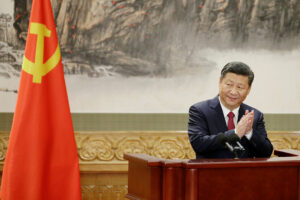BEIJING – Chinese President Xi Jinping and Venezuelan counterpart Nicolas Maduro have signed bilateral cooperation agreements in areas such as economy, trade and tourism, state broadcaster China Central Television (CCTV) reported.
The two nations also signed deals on science and technology, civil aviation and aerospace, CCTV reported on Wednesday.
The pair met during Maduro’s first visit to Beijing in five years against a backdrop of China’s testy relations with the West and energy and debt repayment talks. China is the world’s largest oil importer and oil-rich Venezuela’s largest creditor.
China and Venezuela have long-standing warm ties seen in China’s regular oil purchases despite US sanctions and financial support it bestows upon the cash-strapped Latin American country via loan-for-oil deals and investment.
China on Wednesday upgraded relations with Venezuela to an “all-weather strategic partnership”, typically reserved for a select few nations. The world’s second-largest economy is owed over $10 billion by Venezuela, independent data showed.
Xi said the two countries are “good friends with mutual trust” and common development, state media reported.
He also noted that next year will be the 50th anniversary of the establishment of the pair’s diplomatic relations.
Maduro said Venezuela supports China’s Belt and Road Initiative to boost trade infrastructure, Chinese media said, referring to a related conference in China next month. China has said it has Belt and Road cooperation agreements with more than 150 countries and over 30 international organizations.
He also said Venezuela is willing to closely communicate and cooperate with China within multilateral frameworks such as with the BRICS group and United Nations.
Venezuela is courting membership of BRICS – a group of major emerging economies Brazil, Russia, India, China and South Africa – which recently favored expansion.
A joint statement issued by China’s foreign ministry on Thursday stated that Venezuela is willing to join financial institutions and financing cooperation initiatives such as the New Development Bank set up by BRICS, and will continue to support the internationalization of the yuan.
Venezuela in the statement said, as a reliable supplier with the world’s largest oil and fourth-largest natural gas reserves, it can make important contributions to BRICS’ energy agenda.
China said it is willing to support construction of special economic zones in Venezuela and both countries agreed to further develop bilateral trade and “enrich the variety of trade goods”.
In the statement they also said agreements on aviation and aerospace include future flights between the countries and cooperation in spaceflight.
The countries also agreed to deepen cooperation between legislative bodies to strengthen exchanges on legislation and governance. — Reuters

